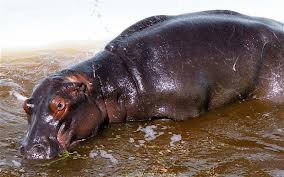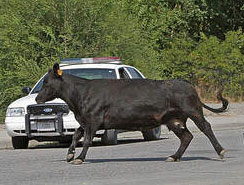 Animal Radio® Show #667 September 15, 2012 Animal Radio® Show #667 September 15, 2012
Blessing Of The Animals
Dr. James Capers
 Dr. James Capers joins us to “Bless” the animals. Traditionally a Catholic holiday, the Blessing of the Animals is held every year on or around October 4 to commemorate Saint Francis of Assisi (1181-1226). It has become a worldwide festival, celebrated by a variety of religions in recognition of our animal friends. St. Francis of Assisi was a Roman Catholic friar and is the patron of animals and the environment. He believed that humans had the ability and moral responsibility to protect animals, a simple and compassionate edict that we should all do our best to live by. Dr. James Capers joins us to “Bless” the animals. Traditionally a Catholic holiday, the Blessing of the Animals is held every year on or around October 4 to commemorate Saint Francis of Assisi (1181-1226). It has become a worldwide festival, celebrated by a variety of religions in recognition of our animal friends. St. Francis of Assisi was a Roman Catholic friar and is the patron of animals and the environment. He believed that humans had the ability and moral responsibility to protect animals, a simple and compassionate edict that we should all do our best to live by.
‘Do-it-yourself’ Franciscan Animal Blessing:
For all animals:
Blessed are you, Lord God,
maker of all living creatures.
On the fifth and sixth days of creation,
you called forth fish in the sea,
birds in the air and animals on the land.
You inspired St. Francis to call all animals
his brothers and sisters.
We ask you to bless this animal.
By the power of your love,
enable it to live according to your plan.
May we always praise you
for all your beauty in creation.
Blessed are you, Lord our God, in all your creatures!
Amen.
For a sick animal:
Heavenly Father,
you created all things for your glory
and made us stewards of this creature.
 If it is your will, restore it to health and strength. If it is your will, restore it to health and strength.
Blessed are you, Lord God,
and holy is your name forever and ever.
Amen.
Dr. James Capers has been a pet clairvoyant for close to 20 years, first learning how to communicate with animals with his cat, “Felicia,” who lived to be 21 years and 6 months old. He has done pet counseling and has helped a dog who refused to eat dog food after being fed only table scraps; he helped a cat who refused to get off the bed (it turns out she was afraid of mice!); and an elderly Schnauzer who was afraid his guardian was going to
“put him to sleep.”
http://www.drjamescapers.com
Protect Your Pet Against Fleas
Dr. Paris Revoir, Bayer
 Even with the summer months ending, fleas are still a problem and can be a problem year round. You may treat your pet, but what about the other elements, such as your house and your yard? Fleas are around the house, in the bushes, under the deck, etc. However, you won’t find them hanging around in the sun, as fleas prefer shade. Even with the summer months ending, fleas are still a problem and can be a problem year round. You may treat your pet, but what about the other elements, such as your house and your yard? Fleas are around the house, in the bushes, under the deck, etc. However, you won’t find them hanging around in the sun, as fleas prefer shade.
If you do see a flea on your pet, remember that that one flea represents only 5% of the total stages of the infestation. One female flea can lay 25 to 50 eggs per day on your pet. Those eggs will fall off, perhaps onto your carpet or pet’s bedding, and make up 50% of the infestation. These eggs will hatch into larvae, which make up about 35%, and the remaining 10% is in the pupa stage. Most people are only concerned with the 5% of fleas that they see, and they are not aware of the remaining 95% of the flea life stages just waiting to infest your pet.
Fleas not only cause itching, but they can also transmit tapeworms. A flea can carry immature stages of a tapeworm. When a dog or cat chews at himself or herself, they ingest the flea, causing tapeworms. If your pet has fleas, it is not a matter of if, but when, they will get tapeworms. If you haven’t seen a tapeworm, they look like pieces of rice around the tail.
 So as a pet owner, what can you do to prevent fleas from infesting your pet? It is a good idea to make sure to treat dogs and cats with a flea product that kills fleas at all life stages, such as Advantage II. Monthly treatment, year round, with Advantage II prevents fleas on a treated pet from infesting your home and since the product is waterproof, your pet remains protected from fleas even if they get wet. So as a pet owner, what can you do to prevent fleas from infesting your pet? It is a good idea to make sure to treat dogs and cats with a flea product that kills fleas at all life stages, such as Advantage II. Monthly treatment, year round, with Advantage II prevents fleas on a treated pet from infesting your home and since the product is waterproof, your pet remains protected from fleas even if they get wet.
Advantage II is a once-monthly topical solution for both cats and dogs, and kills all fleas at all life stages. Advantage II attacks fleas in immature stages, such as larvae and eggs, so that they are unable to mature or reproduce.
You should also use additional measures to reduce the number of immature stages in the environment, such as vacuuming and washing pet bedding if an infestation has already occurred.
Advantage II is available at veterinary clinics and pet specialty stores. Remember, one of the most important things you can do for your pet is to visit your veterinarian regularly for wellness check-ups. For more information on Advantage II, please visit www.petparents.com. You will also find a lot of other information for all pet parents’ needs at this great website.
The Dogfather's Grooming Tip with Joey Villani

Smelly Faced Dogs
Joey is frequently asked about dogs who have a smelly face. This is more common in dogs that have smashed faces, such as pugs.
If your dog has short hair, it is real easy to take care of. Just take a little bit of cornstarch or mediated powder like Gold Bond. You just place it in the folds on their face, and it keeps the wrinkles dry.
If you have a longhaired dog, it is more difficult for two reasons. First, it cakes up in the hair and will matt. It is also hard to keep it out of their eyes.
For the longhaired dog, start with Q-tips and hydrogen peroxide. Dip the Q-tips into the hydrogen peroxide. However, don’t dip it in the container, as this will contaminate the whole bottle. Pour a little into a small container and then dip the Q-tip in it. With the wet Q-tip, wipe down the folds and underneath the eyes (not on the corner of their eyes). Throw away the rest of the solution when you are done.
 You will find that you will be removing something that appears to be a mucus-like discharge. It may also look green and slimy. Unfortunately this area stays wet because of a dog’s tears, or even when it gets wet by itself, it just doesn’t dry because of the folds of skin. You will find that you will be removing something that appears to be a mucus-like discharge. It may also look green and slimy. Unfortunately this area stays wet because of a dog’s tears, or even when it gets wet by itself, it just doesn’t dry because of the folds of skin.
When you have wiped it all out, dry the skin with a tissue or clean cloth. Next, go in with just a little bit of cornstarch. If you do get it in their eyes, it won’t harm them. However, just add a little bit because you don’t want the long hair to matt. This will draw the remaining moisture out.
There is no need to use expensive products, such as facial deodorant for dogs, as this can be very irritating.
In the beginning, you will need to do this every day for about a week. After that, if you do this about once a week, you will notice that the odor is gone.
Animal Radio® News with Stacey Cohen
 Sad Ending For Solly The Swimming Pool Hippo Sad Ending For Solly The Swimming Pool Hippo
It started out as a happy story and now it’s a tragic story. “It’s devastating,” said Ruby Ferreira, manager of the game preserve lodge where the hippopotamus had been stuck in the swimming pool. Dominant males had chased the 4-year-old hippo from his herd when he wandered into the Conservation Lodge and plopped into its 8-foot-deep pool. Although he was able to swim freely, he couldn’t get out because the pool has no steps. Lodge workers dubbed him Solly, and the hippo’s plight captivated South Africans. Someone even set up a Twitter account on Solly’s behalf and tweeted purported hippo quotes. Then a few days later the TV news carried a scrolling headline announcing the animal’s death. A game capture team had been waiting for a veterinarian to show up to tranquilize Solly and oversee the operation to hoist him out with a crane. Then, just as veterinarian arrived the hippo tried one last time to get to his feet. He couldn’t make it. Exhausted, he dropped his head into the knee-deep water, making a splash, then lay still. A Wildlife rescue expert was in tears as he confirmed that Solly was dead. Hippos are sensitive creatures and Solly’s stress level had probably been rising since he was forced from his group, called a pod, and took shelter in the pool. Once inside, he couldn’t get out, adding to his stress.
 Candy Eating Cows Candy Eating Cows
You know what they say: If life gives you bulk quantities of defective candy unfit for human consumption, make chocolate-laced cattle feed. Or that's what they say in Kentucky apparently, where an industrious cattleman has responded to skyrocketing corn prices by swapping out the corn in his 1,400 cows' diets for low-grade candy. The Peducah, Ky.-based WPSD Local reports that Joseph Watson, owner of United Livestock Commodities, believes that candy is a healthy drought-time substitute for corn, even suggesting that its advantages over vegetables go beyond price. "It actually has a higher ratio of fat (than) actually feeding them straight corn." But John Waller, a professor of animal nutrition at the University of Tennessee, said he didn't seem the least bit scandalized by candy-fattened cows. "I think it's a viable (diet)," Waller said. "It keeps fat material from going out in the landfill and it's a good way to get nutrients in these cattle.
 Stray Cow Causes Injuries Stray Cow Causes Injuries
A 52-year-old Montana man is recovering from injuries sustained after a stray cow ran amok on the streets of downtown Billings last week. The Billings Gazette reports the man suffered broken bones and sore ribs after being charged by the 1,200-pound black Angus cow. The victim had been working on a construction site when he saw police and decided to help them catch the cow. The bolting bovine had escaped during uploading at the Public Auction Yards. The Gazette says the cow also knocked over a cyclist and pedestrians during its rampage. Local police said they were not equipped to wrangle the animal in a city environment. The cow was finally shot after a two-hour chase. The injured man was released from the hospital the following day.
West Nile Virus On Rise In Humans And Horses
West Nile virus cases are rising in humans and horses this year. Just as people must take precautions against the virus, horse owners should take steps to protect their animals. Dr. Tracy Norman recommends vaccinating horses against the disease and taking measures to prevent mosquito bites. Norman is the Clinical Assistant Professor at the Texas A&M College of Veterinary Medicine & Biomedical Sciences Large Animal Clinic. Mosquitoes transmit the virus from avian hosts to humans and horses, which are considered “dead-end” hosts of West Nile because the virus is not contagious among them. In those bitten by an infected mosquito, the virus can multiply in the blood system, cross the blood brain barrier and infect the brain. There, it can cause inflammation, interfering with central nervous system functions. Most infected horses do not show signs of the disease. (Most humans don't either, for that matter.) In horses that do show signs of the virus, symptoms are similar to other neurological diseases. They can include impairment of basic motor skill, including loss of coordination or asymmetrical weakness, a change in behavior or drowsiness. Horses with West Nile may have a fever early in the disease and show sensitivity to touch and sound, as well as twitching in the face, muzzle and neck.
 Senior Pet Month Senior Pet Month
September is senior pet wellness month and now is the time to highlight the importance of routine examinations for these older pets. Pet life expectancy has doubled over the last fifty years due in part to improved nutrition and more regular veterinary care. While the old saying of "One year equals seven years in a pet" isn't strictly accurate, it's a good gauge to keep in mind. This means that you'll have a senior dog, similar to a person at age fifty, at seven years old and at ten years for a cat. Just like our routine check-ups get more important as we age, the same is true for your pets. Treatable conditions can be caught earlier, making the chance of recovery that much greater. Keep in mind that larger breed dogs can age quicker than their smaller counterparts and toy breeds more slowly. Contact your veterinarian to see what type of screening they have in place for your older pets.
Craigslist Scam On Lost Pets
Losing a pet is an emotional time for any pet owner and the best possible scenario is for your pet to come home on its own, the next is to receive a call from someone who found your pet, safe and uninjured. The Connecticut Humane Society has issued a warning about a scam preying on vulnerable pet owners. The Humane Society said the culprit is taking to Craigslist to trick people who have lost their animals. The Humane Society has posted a warning about the scam on Craig's List as well. The person these pet owners are speaking with does not represent the Connecticut Humane Society or any other shelter. The Connecticut Humane Society is urging people who think they may have been scammed to file a police report.
 NEWS UPDATE Brought To You By ScoopFree.com. Free Shipping on trays plus up to $20 off your first subscription. NEWS UPDATE Brought To You By ScoopFree.com. Free Shipping on trays plus up to $20 off your first subscription.
 Listen to the
entire Podcast of this show (#667) Listen to the
entire Podcast of this show (#667)
|

 Dr. James Capers joins us to “Bless” the animals. Traditionally a Catholic holiday, the Blessing of the Animals is held every year on or around October 4 to commemorate Saint Francis of Assisi (1181-1226). It has become a worldwide festival, celebrated by a variety of religions in recognition of our animal friends. St. Francis of Assisi was a Roman Catholic friar and is the patron of animals and the environment. He believed that humans had the ability and moral responsibility to protect animals, a simple and compassionate edict that we should all do our best to live by.
Dr. James Capers joins us to “Bless” the animals. Traditionally a Catholic holiday, the Blessing of the Animals is held every year on or around October 4 to commemorate Saint Francis of Assisi (1181-1226). It has become a worldwide festival, celebrated by a variety of religions in recognition of our animal friends. St. Francis of Assisi was a Roman Catholic friar and is the patron of animals and the environment. He believed that humans had the ability and moral responsibility to protect animals, a simple and compassionate edict that we should all do our best to live by. If it is your will, restore it to health and strength.
If it is your will, restore it to health and strength.


 You will find that you will be removing something that appears to be a mucus-like discharge. It may also look green and slimy. Unfortunately this area stays wet because of a dog’s tears, or even when it gets wet by itself, it just doesn’t dry because of the folds of skin.
You will find that you will be removing something that appears to be a mucus-like discharge. It may also look green and slimy. Unfortunately this area stays wet because of a dog’s tears, or even when it gets wet by itself, it just doesn’t dry because of the folds of skin.  Sad Ending For Solly The Swimming Pool Hippo
Sad Ending For Solly The Swimming Pool Hippo  Candy Eating Cows
Candy Eating Cows  Stray Cow Causes Injuries
Stray Cow Causes Injuries  Senior Pet Month
Senior Pet Month 